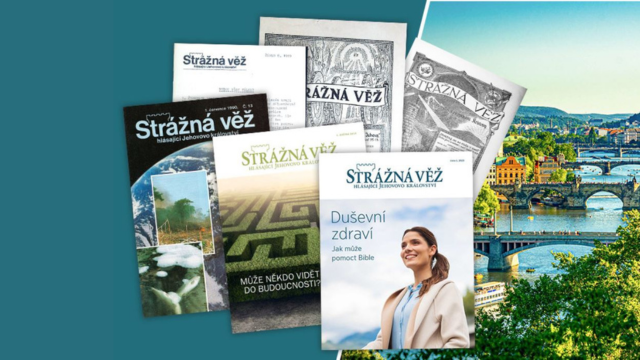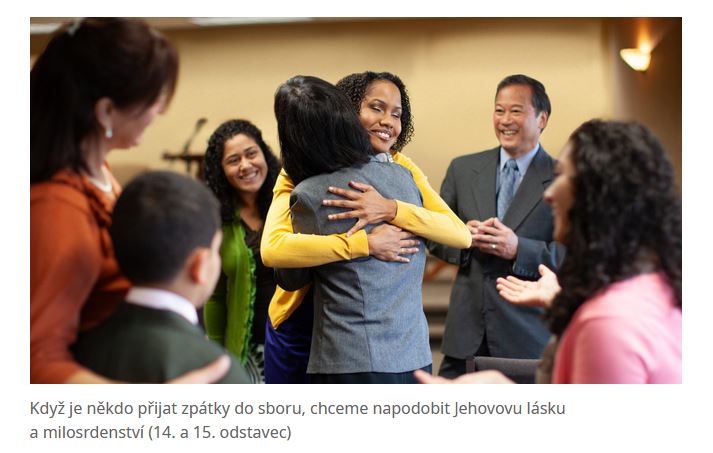by Massimo Introvigne
 “The Watchtower” has been published in Czech for more than one hundred years. Source: JW.org.
“The Watchtower” has been published in Czech for more than one hundred years. Source: JW.org.
The Czech Ministry of Culture has announced it will not proceed with administrative dissolution proceedings against the local Religious Association of Jehovah’s Witnesses. The announcement comes after months of scrutiny, public debate, and a flood of documentation submitted by the Witnesses, culminating in what can only be described as a resounding victory for freedom of belief.
The case began in September 2024, when the Ministry issued a warning that the Jehovah’s Witnesses might face deregistration—a move that would have led to the liquidation of the organization and the forfeiture of its legal status. As Bitter Winter reported at the time, the threat was so severe that it echoed the authoritarian tactics used in Russia, where Jehovah’s Witnesses have been banned and persecuted. Under Czech law, deregistration triggers liquidation. Unless the liquidated church had previously indicated another church to which the proceeds of the liquidation should be transferred, “the net proceeds shall accrue to the State, which shall use the net proceeds for the benefit of other registered churches” (article 24.6 of the 2022 Czech law on freedom of religious confessions). The draconian consequences of dissolution raised alarm among legal scholars and human rights advocates internationally. Several of them, including Czech scholars, protested and signed appeals.
The Jehovah’s Witnesses mounted a robust defense in response to the warning letter. Thousands of individual members submitted letters to the Ministry expressing their personal convictions and defending their faith. While the Ministry has questioned the authenticity of some letters, in fact, its representatives had praised them during a joint meeting with the Jehovah’s Witnesses for their clarity, sincerity, and individuality.
The Witnesses submitted expert opinions and legal precedents that swayed the Ministry’s final decision. Central among these was the March 14, 2025, ruling of the Court of Appeal of Borgarting, Norway, which reversed a first-degree decision the Czech Ministry had relied upon. The Court of Appeal upheld the Witnesses’ practice of “social distancing” from excluded or apostate former members, including minors, as consistent with both the European Convention on Human Rights and the United Nations Convention on the Rights of the Child. The Norwegian ruling confirmed similar decisions from courts in Belgium, Italy, and elsewhere, affirming that religious communities have the right to regulate internal discipline without violating human rights and that religious freedom statutes protect the Jehovah’s Witnesses’ exclusion practices.
The Witnesses also submitted clarifications from the August 2024 issue of The Watchtower, which refined their teachings on repentance and removal from the congregation. These articles, studied globally in five consecutive services, emphasized empathy, kindness, and the goal of restoration. Removal is portrayed as a last resort, and even then, elders are instructed to maintain dignity, offer guidance, and facilitate reinstatement. Particularly noteworthy is the treatment of baptized adolescents: elders defer to parental advice and intervene only in rare cases, with removal being exceedingly uncommon.
 From the Czech edition of the August 2024 Watchtower issue: “Reflecting Jehovah’s love and mercy, the congregation warmly welcomes back those who have been reinstated (See paragraphs 14-15).”
From the Czech edition of the August 2024 Watchtower issue: “Reflecting Jehovah’s love and mercy, the congregation warmly welcomes back those who have been reinstated (See paragraphs 14-15).”
On the sensitive issue of blood transfusions, the Witnesses presented expert opinions from Czech medical authorities. They emphasized that seeking alternatives to transfusion is medically sound and legally protected. They also noted that transfusions are often overused and carry significant risks, especially for children, and affirmed the right of parents to seek second opinions.
These expert submissions demonstrated that Jehovah’s Witnesses respect Czech law, including provisions that allow doctors to override parental objections in life-threatening situations. No legal cases have been filed against the Witnesses on this matter in the Czech Republic, underscoring their commitment to lawful conduct.
In light of these clarifications, the Ministry of Culture concluded that there were no grounds for the draconian measure of dissolution. The decision vindicates the Jehovah’s Witnesses and reaffirms the Czech Republic’s dedication to pluralism and the rule of law.
This outcome should inspire other countries facing similar debates. Religious freedom is not a privilege the state grants but a fundamental right. The Czech Republic has taken a principled stand. Its decision is a model for democratic societies worldwide.